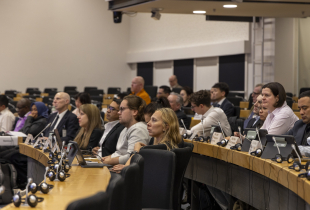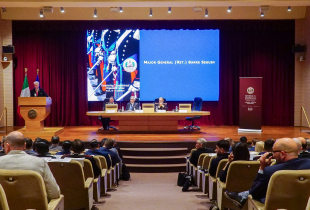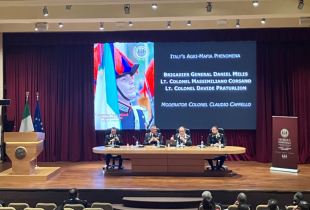
Marshall Center's Combating Transnational Crime Course 'Brings Strategies to Life'
By Christine June
Public Affairs Office
George C. Marshall European Center for Security Studies
GARMISCH-PARTENKIRCHEN, Germany (Dec. 15, 2016) – Packing tools to bring strategies to life, 90 practitioners are heading home to 52 countries after graduating from the George C. Marshall European Center for Security Studies’ Program on Countering Transnational Organized Crime Dec. 15.
“It’s crucial for me that I have now learned very clearly how to develop a very clear, measurable and acceptable strategy given the fact that my country is one of the primary victims of transnational organized crime and terrorism,” said Ahmed Zia Asey, director general for Monitoring and Evaluation with the Ministry of Interior Affairs in Kabul, Afghanistan.
In its fifth rotation at the Marshall Center, CTOC is a constantly evolving 12-day resident program that focuses on 21st century national security threats as a result of illicit trafficking and other transnational criminal activities. Held twice a year, CTOC examines the major methods by which transnational criminal and terrorist organizations engage in criminal activities.
“The vision of this course is to give participants exposure to strategy and policy in countering transnational organized crime,” said U.S. Army Lt. Col. Robert Peters, one of two deputy course directors for CTOC, who has been involved in the program for four rotations. “When they come to the CTOC course, they not only get exposed to the different forms of transnational organized crime, but they also go away with some tools to develop policies and strategies that they can use when they go home.”
Transnational organized crime is growing in size and influence in a world increasingly marked with globalization and diminishing importance of borders or as the CTOC Course Director Professor Joe Vann said, “It is an increasingly globalized problem that requires a global response.
“And, this is a global course,” Vann continued. “Unlike national or even regional studies of crime, we hope to take participants to a higher level of understanding and to impress upon them the absolute need for international cooperation. As in the case with combatting terrorism, we need a network to defeat a network.”
The learning method for the CTOC course uses a lecture-seminar format. Course participants meet each academic day for lectures or panel discussions, followed by a question-and-answer period.
One key note speaker during the course was Bryan Hurd, a cyber security expert. He said to these crime fighters, “Technology will not solve organized crime. Politics will solve it. Diplomacy will solve it. The strategy and processes that you develop here will solve it.
“Whatever position you are in in your government, you can effect global change. You are responsible to reach back and down to find the change agents and help them.”
After lectures, participants meet in small group seminars, where they have the opportunity to engage in discussions, examine concepts presented in lectures, and most importantly, learn from each other.
Peters added that CTOC’s learning method includes valuing the local knowledge and expertise of the participants in order to shape and inform larger strategies and policies in countering transnational organized crime.
With this mind, participants were given models, worksheets and guidance to complete an exercise to develop policies and strategies to combat some or one form of transnational organized crime in a real or fictional country utilizing a whole-of-government-approach. They were given this assignment almost from day one of the program. Each day, the participants were additionally equipped for this exercise with tools and knowledge from each lecture and panel discussion with Marshall Center faculty and guest lecturers in government, academia, law enforcement and security organizations from around the world.
“The assignment was very clear: how do we put into practice what we have learned in regards to policy and strategy development,” said Asey, who was the lead strategist, working with two of his fellow seminar group participants from Japan and Romania.
They chose to work on developing a counter migrant smuggling strategy to provide a clear road map to counter this emerging phenomenon in the Eastern Balkan region, while the rest of their seminar worked on policies to support their strategy.
“We did an analysis of the situation, looking into the strengths and weakness of the existing threats,” Asey said. “Based on this analysis, we went on to develop a vision statement, making sure it was a measurable and clear mission. Then, we developed three assumptions, linking them to recommendations and three goals of our strategy.”
For each of these goals, Asey’s team had to provide three objectives, which gave the whole assignment a conclusion. Each of the seven seminars presented their conclusions the day before graduation.
“This exercise gives the participants a chance to do policies and strategies that they may not get to do in their countries,” said Peters, who was one of Asey’s seminar leaders. “We really emphasize strategy and policy and how that relates to countering transnational organized crime.
“We are not just admiring the problem,” said Peters. “We are showing how to develop and bring whole-of-government strategies to life by developing effective policies.”


